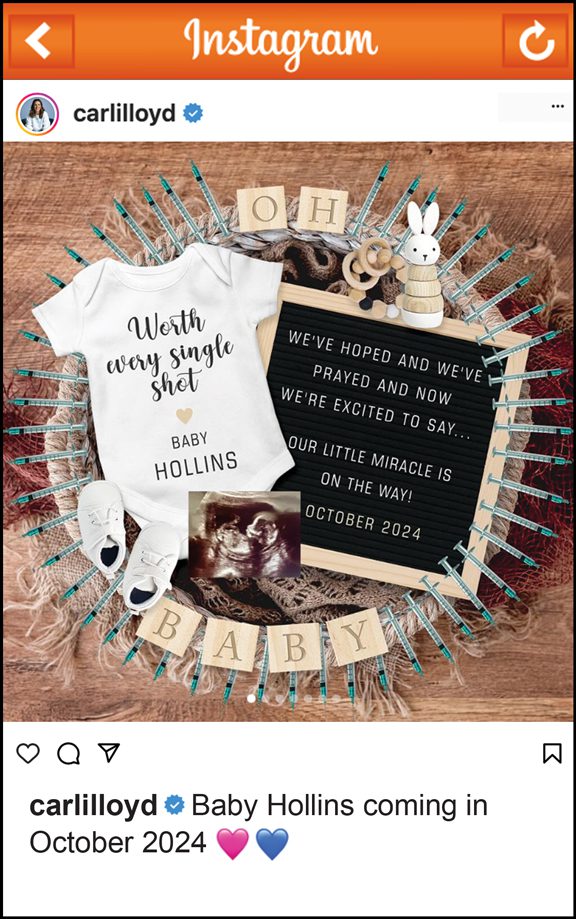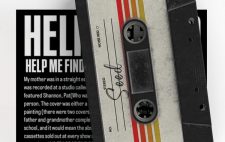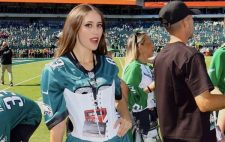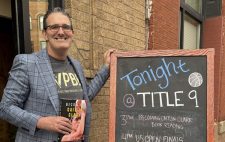Carli Lloyd is used to her dreams coming true. The soccer star is a four-time Olympian and two-time gold medalist. She’s been a FIFA Women’s World Cup Champion twice, and was named FIFA Women’s World Player of the Year in 2015 and The Best FIFA Women’s Player in 2016.
Over the course of a decades-long soccer career, the Delran native became a household name. Her flame only burned brighter after her retirement in 2021, when she began appearing as a TV sports commentator and analyst, and dominated the competition to win the first season of Fox’s boot camp-style reality series, “Special Forces: World’s Toughest Test.”

Carli Lloyd with her husband Brian Hollins
“Throughout my career, I felt like I was in the driver’s seat, in control. This was almost the opposite: I felt broken and hopeless and more vulnerable than I’ve ever been.”
But her real toughest test came as she and her husband, Brian Hollins, went through the grueling process of conceiving a baby through in vitro fertilization. It was ultimately successful, but it wasn’t easy, and as they prepare to welcome their child this fall, Lloyd is sharing her long – and painful – road to motherhood.
“I wasn’t prepared for how challenging it might be,” she says. “I feel like there’s a stigma where no one really talks about their struggles. Growing up, you don’t hear many people talking about going through IVF or IUI (intrauterine insemination).” By telling her own story, Lloyd hopes she’ll help other women struggling with fertility feel less alone.
Lloyd was nearing her 40th birthday when she announced her retirement from professional soccer, and she’d never considered starting a family while she was still playing professionally.
“I always wanted to have a baby, but I was just very focused on completing my career,” she says. “In order to become the best in the world I had to be selfish, essentially, and make that the number-one priority ahead of everything.”
Though it wasn’t unusual for players to give birth and then return to the team, Lloyd says she saw teammates step away to have a baby “and it was, you know, out of sight out of mind. With the national team, it’s so cutthroat. Your spot is always in jeopardy. I always had to come back so much stronger, even from an injury, to prove myself.”
Once she retired, Lloyd’s focus shifted – not to getting pregnant, but to her family and learning to enjoy life again.
“I was still extremely busy – I had all these opportunities, I was filming Special Forces and doing all these things – and my mindset was just that I wanted to enjoy some time with Brian, my friends, my family; kick back and have a cocktail and just enjoy life.”
 When they did begin trying to conceive in the summer of 2022, Lloyd sought out a fertility specialist just to get “checked out” and make sure everything looked normal. Though all her (and Brian’s) testing came back clear, month after month passed without a pregnancy. She had what doctors call “unexplained infertility,” and for the first time in Lloyd’s life, hard work wasn’t enough.
When they did begin trying to conceive in the summer of 2022, Lloyd sought out a fertility specialist just to get “checked out” and make sure everything looked normal. Though all her (and Brian’s) testing came back clear, month after month passed without a pregnancy. She had what doctors call “unexplained infertility,” and for the first time in Lloyd’s life, hard work wasn’t enough.
“I’m so driven, and when I put my mind to something I always feel like I can achieve it,” she says. “I was eating well, and taking supplements, and doing acupuncture and all the other things and just not getting results. The reality was that my biological clock was kind of ticking, and I felt the weight of that. Throughout my career, I felt like I was in the driver’s seat, in control. This was almost the opposite: I felt broken and hopeless and more vulnerable than I’ve ever been.”
Lloyd knew she needed more help, and that’s when she found Dr. Louis Manara at the Center for Reproductive Medicine and Fertility in Voorhees.
“I was willing and open, but at the same time it felt like I was giving up on myself and on the ability to naturally get pregnant,” she says. But Dr. Manara was comforting, knowledgeable and, most importantly, straightforward.
“He was like, ‘In your situation, at your age, the best approach is to go straight to IVF.’”
Lloyd’s first IVF cycle started in April of 2023, and after weeks of hormone injections, egg retrieval and genetic testing, she and Brian had just two embryos. “So if we wanted to have two kids, both would have to work,” she says. They decided to do another retrieval round in an effort to create more viable embryos and improve the odds. Unfortunately, that second round resulted in zero healthy embryos.
“We decided, after two retrievals, that we would just go ahead with the two embryos we had,” says Lloyd. The first embryo transfer, in October of 2023, was unsuccessful: Lloyd didn’t get pregnant.
“You just start to feel like…is this going to happen? Is there light at the end of the tunnel? It doesn’t just feel like you’ve failed. It feels like the end of the world,” she says.
But Lloyd, who made a career out of never backing down from a challenge, gritted her teeth and underwent a third retrieval round. This time, she says, she “surrendered to the process,” leaning on Brian, her family, friends and former teammates for emotional support, and telling herself things would work out as they were meant to. That third round resulted in two more healthy embryos.
A few days after her next transfer, in January of this year, Lloyd and Brian walked into a lab in Arizona, where Lloyd was golfing in the Waste Management Pro-Am tournament, with a prescription for a blood test to see whether Lloyd was pregnant.
“It was a Friday,” Lloyd says. “I asked when the results would be back, and the woman there said oh, probably not until Monday.”
But the next morning, up early and scanning through her inbox, Lloyd saw an email come in with her test results. “All I saw was my beta hCG level, and I didn’t know what that meant. I sent a screenshot to a friend who’d been a major support and she was like, ‘OMG Carli, you’re pregnant!’ I was just in shock for a second. Then Brian woke up and I told him the news, and we just felt so at peace.”
The early weeks were a bit nerve-wracking. Initial ultrasounds showed the baby measuring small, and “Dr. Manara was essentially kind of preparing me for miscarriage,” says Lloyd. But thankfully, the baby’s growth caught up, and it’s been a healthy pregnancy since.
Lloyd’s open about both the emotional and financial burdens of fertility treatment. She was paying out of pocket for her care, and it wasn’t cheap. “Each cycle is probably $25,000, and then you pay another $4 to $5,000 for a transfer,” she says. “It’s extremely expensive and we’re grateful we had the means to do this. I know a lot of people don’t.”
Looking back, Lloyd says, she has no regrets, but she does wish she’d been more educated and prepared about the potential difficulties of starting a family. “For women who are wanting to put off having a baby, I do think it’s so important to get checked out. Look into freezing your eggs. Take steps well before you reach a certain age, and just know that it’s hard, and you don’t know how the journey is going to go. You’ve just got to put one foot in front of the other and stay hopeful.”
That kind of radical honesty is new for Lloyd, but it may be the biggest lesson she’s learned from her toughest test yet. “I think I’ve been wanting to maybe keep my struggles at bay and not really show my vulnerable side. I certainly didn’t during my career,” she says. “But now, it’s nice to be vulnerable, to lean on other people and ask for help. I think that’s a great space to be in before motherhood.”














